|
|
|
Sort Order |
|
|
|
Items / Page
|
|
|
|
|
|
|
| Srl | Item |
| 1 |
ID:
154521
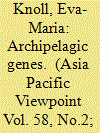

|
|
|
|
|
| Summary/Abstract |
Medical travel has become a self-evident and intrinsic part of the medical landscape in the Republic of Maldives. This article raises the question of how exactly this has emerged as part of today's reality. The analysis describes the unfolding of a pronounced Maldivian medical travel culture by focusing on a particularly pressing health issue. The population of the Maldives has to face the world's highest prevalence of beta-thalassaemia, a genetic disorder affecting the body's ability to create red blood cells. The country's 300:1 sea to land ratio, however, with its small population of 340 000 scattered over 200 islands is a challenging context for the curative and preventive measures in thalassaemia governance. The article follows the trail of thalassaemia-related intra-archipelagic and extra-archipelagic medical travel of patients and clients requesting a blood transfusion, iron monitoring, bone marrow transplantation and prenatal diagnostic services. It discusses medical travel organised as a biosocial group activity, financed by insurance and religious bodies while interacting with the migration of health professionals.
|
|
|
|
|
|
|
|
|
|
|
|
|
|
|
|
| 2 |
ID:
154523
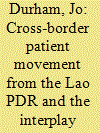

|
|
|
|
|
| Summary/Abstract |
Healthcare is most often examined within the confines of nation-states. Such an analysis, however, is not necessarily indicative of reality, with people often travelling across borders for healthcare. This paper explores cross-border travel for medical care by patients in the Lao People's Democratic Republic. The paper shows that while travelling across borders for medical care is not new, how, why and who travels across borders have changed in tandem with changes in the political and socio-economic landscape. The paper is based on a review of the literature and qualitative interviews with patients who had crossed the border for planned healthcare (N = 43), Laotian medical officials working in public institutions (N = 5) and international health advisors (N = 6). Patients came from different districts, a range of socio-economic backgrounds, had crossed borders for planned healthcare in the last two years and, based on key informant subjective assessments, were information-rich respondents. The study reveals how Lao cross-border patients creatively use the cultural and social resources at their disposal to obtain the healthcare they desire. In particular, it draws attention to the interplay between social, economic and cultural capital, and habitus in navigating access to transnational healthcare.
|
|
|
|
|
|
|
|
|
|
|
|
|
|
|
|
| 3 |
ID:
154526


|
|
|
|
|
| Summary/Abstract |
Singapore has one of the tightest regulations over assisted reproductive technologies (ARTs) in Asia, a consequence of Singapore's strong state, the priority it gives to reproduction, and the numerous religious groups in the country and their direct and indirect influence on the Bioethics Advisory Committee, which recommends ART regulations for the country. Together, these key actors give shape to the ‘local moral worlds’, which undergird ART governance in the country. Drawing on in-depth interviews and data from online forums, we illustrate Singaporean fertility seekers' attempts to juggle myriad and sometimes confusing obligations to the state, society and religion in making reproductive choices. We then explore the limits and possibilities for fertility seekers to circumvent the restrictive rules and ‘moral safety valves’ set in place in their home country simply by stepping out to another jurisdiction across national borders. The paper goes on to show how the Internet communities serve as a bridgespace, propelling fertility mobilities by enabling Singaporeans to see creative possibilities in patchwork regulations. At the edges of state and religious power, fertility-seeking subjects take advantage of liminal spaces, grey areas, or permissive regimes to gain several degrees of freedom to practise adaptive fertility strategies that may be ‘unofficial’ but ‘licit’ or ‘socially acceptable’.
|
|
|
|
|
|
|
|
|
|
|
|
|
|
|
|
| 4 |
ID:
154517


|
|
|
| 5 |
ID:
154529
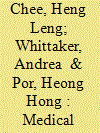

|
|
|
|
|
| Summary/Abstract |
International medical travel may be viewed as an ‘assemblage’ of various components such as infrastructure, hospitals, finance, transport, technologies, staff, facilitators and patients. In this paper, we focus on the articulations of medical travel facilitators (MTFs) and private hospitals in producing international medical travel in the context of the neoliberalising processes that had led to the rise of corporate hospital care in Malaysia in the 1990s. We draw from three hospital case studies for a comparative perspective. We highlight the shifting, unstable and contingent relations and interactions of the MTFs, as one component of the assemblage of international medical travel, with hospitals and medical travellers. We identify the practices of MTFs in providing patients with information and advice about hospitals and doctors as efforts to shape patients' choices in the selection of health-care providers and in decision-making. The assemblage approach allows us to see how the MTFs emerge and stabilise as a collective identity for individuals and companies performing particular functions through their multifarious articulations with other components in various sites of assemblage.
|
|
|
|
|
|
|
|
|
|
|
|
|
|
|
|
| 6 |
ID:
154527


|
|
|
|
|
| Summary/Abstract |
The last decade has seen a marked rise in the phenomenon of the so-called stem cell tourism, whereby people travel from their home countries to access unproven stem cell treatments abroad. Despite increasing attempts on an international level from regulators, policy-makers and scientists to deter people from undergoing potentially harmful treatments, patient demand persists. Over the last decade, China has emerged as a leading destination for people seeking such treatments, where providers of treatments operate in varying ‘shades of grey’. While Chinese government intervention has had some impact on the availability of treatments within China, top-down regulatory measures face limitations considering strong patient demand and the geographical flexibility demonstrated by both patients and providers. This article draws on interviews with Australian patients who have travelled to China for stem cell treatments, or considered it and decided against it, as well as representatives of stem cell clinics in China and other stakeholders. It argues that Australian patients and/or carers articulate a culturally situated moral imperative to act in the face of limited conventional biomedical options and that commercial clinics capitalise on this to attract new patients and sustain the demand – either ‘underground’ in China, or by moving to other jurisdictions.
|
|
|
|
|
|
|
|
|
|
|
|
|
|
|
|
| 7 |
ID:
154519


|
|
|
|
|
| Summary/Abstract |
Intra-regional medical travel by patients from Indonesia to Penang in Malaysia is embedded in and facilitated by regional circuits. Although such movement is fuelled by dissatisfaction with the health-care services offered in Indonesia, we argue that these contemporary movements for health care are also a continuation of existing exchanges for trade, education and cultural ties that have long existed. In the first part of the paper, we consider the historical interconnections between the locations of Medan and Aceh in Indonesia and Penang in Malaysia. Based upon fieldwork and interviews with 70 intra-regional patients travelling to Penang for treatment, we describe how these interconnections are now manifested in travel for medical care. We argue that the temporary exit from the Indonesian health system to pursue care in hospitals in Penang by some Chinese Indonesians and Acehnese follows patterns and logics based on social histories of discrimination and conflict as well as geographical convenience. This highlights the need to contextualise such travel not just as geographic movements across space but also through the depth of time and local histories.
|
|
|
|
|
|
|
|
|
|
|
|
|
|
|
|
| 8 |
ID:
154522
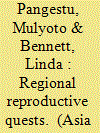

|
|
|
|
|
| Summary/Abstract |
Infertility is a significant reproductive health problem effecting at least 15% of heterosexual Indonesian couples during their reproductive lives. This article explores the preferences and decision-making processes of 15 married infertile Indonesian couples, of high socioeconomic status, regarding intra-regional reproductive travel in Southeast Asia. We consider the reproductive destinations of Singapore, Malaysia and Thailand, revealing their distinct attractions for different couples. We identify a variety of push and pull factors influencing the choice to leave Indonesia to pursue assisted reproduction technologies (ART), as well as the factors shaping the choice of travel destination. One intractable push factor motivating couples to leave Indonesia is the strict regulation of ART, which designates gamete donation and surrogacy as illegal. The paramount concern of our informants was to maximise their chances of reproductive success, and perceptions of higher success rates for conception via ART elsewhere in Asia informed their travel choices. Emotional and psychological concerns were also crucial in determining travel destinations and included a strong desire for privacy; the desire for emotional support whilst attempting conception via ART; the desire for emotional intimacy with one's partner; and the wish for religious compatibility with fertility providers and treatment protocols.
|
|
|
|
|
|
|
|
|
|
|
|
|
|
|
|
| 9 |
ID:
154528
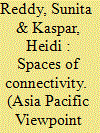

|
|
|
|
|
| Summary/Abstract |
Existing research on the formation of Asian medical travel destinations has highlighted a variety of activities that attract and accommodate patients from abroad. This paper contributes to the literature by drawing insights from an Indian case study, a major transnational health-care hub in Asia that has gained little scholarly attention thus far. Using connectivity as an analytical lens, we understand medical travel destinations as a contingent product of relating, connecting and assembling. We study how connectivity is embodied and how it unfolds in care encounters at corporate hospitals in the capital of New Delhi and surrounding urban areas. The following entities are the most effectual in the networks that constitute medical travel destinations in the National Capital Region: (i) circulating narrations of personal experiences; (ii) language interpreters; and (iii) commission fees. We further elaborate on how these connectors work to link foreign patients with Indian hospitals and how they affect itineraries as well as patients and other involved actors. Finally, we suggest that the approach deployed provides a suitable framework for future research aimed at gaining a better understanding of the wider impacts of medical travel by following these connections and examining their workings at places both close and distant.
|
|
|
|
|
|
|
|
|
|
|
|
|
|
|
|
| 10 |
ID:
154524


|
|
|
|
|
| Summary/Abstract |
This paper addresses the growing phenomenon of cosmetic surgery tourism through a focus on the development of this industry in South Korea. Unlike many discussions of this topic, the paper decentres dominant narratives based on west-goes-east or north-goes-south journeys. Instead, we look at regional flows by exploring the experiences of Chinese patients travelling to South Korea in search of facial cosmetic surgery – procedures often referred to as the ‘Korean Look’ and associated with exported Korean popular culture. We focus on the contested understandings of the motives for and outcomes of this surgery between Korean surgeons and Chinese patients, documenting one example of the cultural investments and (mis)understandings that can impact on the experiences of medical tourists as they travel across national borders in search of treatment. We situate the development of cosmetic surgery tourism in Korea in the context of a discourse we call ‘medical nationalism’, showing how surgeons in particular reproduce this discourse in terms of pride in their contribution to the economic and reputational success of South Korea on a world stage. However, we demonstrate finally that, as a privatised, feminised and trivialised form of medicine, cosmetic surgery will always fail to deliver in this respect.
|
|
|
|
|
|
|
|
|
|
|
|
|
|
|
|
|
|
|
|
|